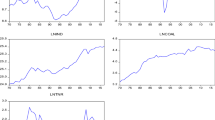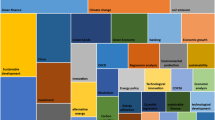Abstract
This study aims to examine the asymmetric impact of financial institutions and information and communication technologies (ICT) trade on renewable energy demand in BRICS economies by using the cross-sectionally augmented nonlinear autoregressive distributed lag model. The asymmetric estimates of the financial institutions index confirm that a positive shock increases renewable energy consumption, and a negative shock reduces renewable energy consumption in BRICS economies. Similarly, the long-run asymmetric estimates attached to ICT trade are positively significant, confirming that a positive shock increases renewable energy consumption and a negative shock hurts renewable energy consumption. As far as country-wise estimates are concerned, the long-run asymmetric estimates of financial institutions are significant in Brazil, Russia, China, and South Africa. Similarly, the asymmetric estimates attached to ICT trade are significant in Russia, China, India, and South Africa. The results are asymmetric in nature, implying that negative and positive shocks have different effects on renewable energy consumption. Therefore, policymakers should consider both negative and positive shocks in financial institutions and ICT trade while devising policies regarding environmental sustainability and renewable energy consumption.
Similar content being viewed by others
References
Aized T, Shahid M, Bhatti AA, Saleem M, Anandarajah G (2018) Energy security and renewable energy policy analysis of Pakistan. Renew Sust Energ Rev 84:155–169
Al-Mulali U, Sab CNBC (2012) The impact of energy consumption and CO2 emission on the economic growth and financial development in the Sub Saharan African countries. Energy 39(1):180–186
Anton SG, Nucu AEA (2020) The effect of financial development on renewable energy consumption. A panel data approach. Renew Energy 147:330–338
Apergis N, Payne JE (2010) Renewable energy consumption and economic growth: evidence from a panel of OECD countries. Energy Policy 38(1):656–660
Belkhir L, Elmeligi A (2018) Assessing ICT global emissions footprint: trends to 2040 & recommendations. J Clean Prod 177:448–463
Bhattacharya M, Paramati SR, Ozturk I, Bhattacharya S (2016) The effect of renewable energy consumption on economic growth: evidence from top 38 countries. Appl Energy 162:733–741
Caglar AE, Balsalobre-Lorente D, Akin CS (2021) Analysing the ecological footprint in EU-5 countries under a scenario of carbon neutrality: Evidence from newly developed sharp and smooth structural breaks in unit root testing. J Environ Manag 295:113155
Caglar AE (2020) The importance of renewable energy consumption and FDI inflows in reducing environmental degradation: bootstrap ARDL bound test in selected 9 countries. J Clean Prod 264:121663
Caglar AE, Mert M (2022) Carbon hysteresis hypothesis as a new approach to emission behavior: a case of top five emitters. Gondwana Res 109:171–182
Caglar AE, Ulug M (2022) The role of government spending on energy efficiency R&D budgets in the green transformation process: insight from the top-five countries. Environ Sci Pollut Res, 1-13
Chudik A, Pesaran MH (2015) Common correlated effects estimation of heterogeneous dynamic panel data models with weakly exogenous regressors. J Econ 188(2):393–420
Deka A, Cavusoglu B, Dube S (2022) Does renewable energy use enhance exchange rate appreciation and stable rate of inflation? Environ Sci Pollut Res 29(10):14185–14194
Feng J, Sun Q, Sohail S (2022) Financial inclusion and its influence on renewable energy consumption-environmental performance: the role of ICTs in China. Environ Sci Pollut Res, 1-8
Godil DI, Yu Z, Sharif A, Usman R, Khan SAR (2021) Investigate the role of technology innovation and renewable energy in reducing transport sector CO2 emission in China: a path toward sustainable development. Sustain Dev 29(4):694–707
Isik C, Dogru T, Turk ES (2018) A nexus of linear and non-linear relationships between tourism demand, renewable energy consumption, and economic growth: theory and evidence. Int J Tour Res 20(1):38–49
Islam F, Shahbaz M, Ahmed AU, Alam MM (2013) Financial development and energy consumption nexus in Malaysia: a multivariate time series analysis. Econ Model 30:435–441
Jacobsson S, Bergek A (2004) Transforming the energy sector: the evolution of technological systems in renewable energy technology. Ind Corp Chang 13(5):815–849
Kao C (1999) Spurious regression and residual-based tests for cointegration in panel data. J Econ 90(1):1–44
Khan SAR, Sharif A, Golpîra H, Kumar A (2019) A green ideology in Asian emerging economies: from environmental policy and sustainable development. Sustain Dev 27(6):1063–1075
Lange S, Pohl J, Santarius T (2020) Digitalization and energy consumption. Does ICT reduce energy demand? Ecol Econ 176:106760
Lei W, Ozturk I, Muhammad H, Ullah S (2021) On the asymmetric effects of financial deepening on renewable and non-renewable energy consumption: insights from China. Econ Res-Ekonomska Istraživanja, 1-18
Li W, Ullah S (2022) Research and development intensity and its influence on renewable energy consumption: evidence from selected Asian economies. Environ Sci Pollut Res, 1-8
Li X, Ozturk I, Ullah S, Andlib Z, Hafeez M (2022) Can top-pollutant economies shift some burden through insurance sector development for sustainable development? Econ Anal Policy 74:326–336
Li X, Younas MZ, Andlib Z, Ullah S, Sohail S, Hafeez M (2021) Examining the asymmetric effects of Pakistan’s fiscal decentralization on economic growth and environmental quality. Environ Sci Pollut Res 28(5):5666–5681
Lv Z, Liu W, Xu T (2022) Evaluating the impact of information and communication technology on renewable energy consumption: a spatial econometric approach. Renew Energy 189:1–12
Malmodin J, Lundén D (2018) The energy and carbon footprint of the global ICT and E&M sectors 2010–2015. Sustainability 10(9):3027
Mert M, Caglar AE (2020) Testing pollution haven and pollution halo hypotheses for Turkey: a new perspective. Environ Sci Pollut Res 27(26):32933–32943
Mickoleit A (2010) Greener and smarter: ICTs, the environment and climate change (no. 2010/1). OECD Publishing
Mukhtarov S, Yüksel S, Dinçer H (2022) The impact of financial development on renewable energy consumption: evidence from Turkey. Renew Energy 187:169–176
Murshed M (2020) An empirical analysis of the non-linear impacts of ICT-trade openness on renewable energy transition, energy efficiency, clean cooking fuel access and environmental sustainability in South Asia. Environ Sci Pollut Res 27(29):36254–36281
Noureen S, Iqbal J, Chishti MZ (2022) Exploring the dynamic effects of shocks in monetary and fiscal policies on the environment of developing economies: evidence from the CS-ARDL approach. Environ Sci Pollut Res 29(30):45665–45682
Ozili PK (2018) Impact of digital finance on financial inclusion and stability. Borsa Istanbul Rev 18(4):329–340
Ozturk I, Acaravci A (2010) CO2 emissions, energy consumption and economic growth in Turkey. Renew Sust Energ Rev 14(9):3220–3225
Ozturk I, Ullah S (2022) Does digital financial inclusion matter for economic growth and environmental sustainability in OBRI economies? An empirical analysis. Resour Conserv Recycl 185:106489
Pesaran MH (2007) A simple panel unit root test in the presence of cross-section dependence. J Appl Econ 22(2):265–312
Raza SA, Shah N, Qureshi MA, Qaiser S, Ali R, Ahmed F (2020) Non-linear threshold effect of financial development on renewable energy consumption: evidence from panel smooth transition regression approach. Environ Sci Pollut Res 27(25):32034–32047
Sadorsky P (2010) The impact of financial development on energy consumption in emerging economies. Energy Policy 38(5):2528–2535
Saini S, Neog Y (2018) Examining the linkages between financial development and energy consumption in India. In International Conference on Economics and Finance (pp. 119-130). Springer, Cham
Shahbaz M, Topcu BA, Sarıgül SS, Vo XV (2021) The effect of financial development on renewable energy demand: the case of developing countries. Renew Energy 178:1370–1380
Sharif A, Afshan S, Chrea S, Amel A, Khan SAR (2020a) The role of tourism, transportation and globalization in testing environmental Kuznets curve in Malaysia: new insights from quantile ARDL approach. Environ Sci Pollut Res 27(20):25494–25509
Sharif A, Baris-Tuzemen O, Uzuner G, Ozturk I, Sinha A (2020b) Revisiting the role of renewable and non-renewable energy consumption on Turkey’s ecological footprint: evidence from Quantile ARDL approach. Sustain Cities Soc 57:102138
Sharif A, Raza SA, Ozturk I, Afshan S (2019) The dynamic relationship of renewable and nonrenewable energy consumption with carbon emission: a global study with the application of heterogeneous panel estimations. Renew Energy 133:685–691
Sohail MT, Xiuyuan Y, Usman A, Majeed MT, Ullah S (2021) Renewable energy and non-renewable energy consumption: assessing the asymmetric role of monetary policy uncertainty in energy consumption. Environ Sci Pollut Res 28(24):31575–31584
Suki NM, Sharif A, Afshan S, Suki NM (2020) Revisiting the Environmental Kuznets Curve in Malaysia: the role of globalization in sustainable environment. J Clean Prod 264:121669
Usman A, Ozturk I, Hassan A, Zafar SM, Ullah S (2021) The effect of ICT on energy consumption and economic growth in South Asian economies: an empirical analysis. Telematics Inform 58:101537
Wei L, Ullah S (2022) International tourism, digital infrastructure, and CO2 emissions: fresh evidence from panel quantile regression approach. Environ Sci Pollut Res, 1-8
Westerlund J (2007) Testing for error correction in panel data. Oxf Bull Econ Stat 69(6):709–748
Wolde-Rufael Y (2010) Coal consumption and economic growth revisited. Appl Energy 87(1):160–167
Yang L, Hui P, Yasmeen R, Ullah S, Hafeez M (2020) Energy consumption and financial development indicators nexuses in Asian economies: a dynamic seemingly unrelated regression approach. Environ Sci Pollut Res 27(14):16472–16483
Zhao S, Hafeez M, Faisal CMN (2022) Does ICT diffusion lead to energy efficiency and environmental sustainability in emerging Asian economies? Environ Sci Pollut Res 29(8):12198–12207
Data availability
The datasets used and/or analyzed during the current study are available from the corresponding author on reasonable request.
Author information
Authors and Affiliations
Contributions
This idea was given by LW. LW, YH, and AG analyzed the data and wrote the complete paper, while MH, RS, and YH read and approved the final version.
Corresponding author
Ethics declarations
Ethics approval
Not applicable
Consent to participate
I am free to contact any of the people involved in the research to seek further clarification and information
Consent for publication
Not applicable
Competing interests
The authors declare no competing interests.
Additional information
Responsible Editor: Arshian Sharif
Publisher’s note
Springer Nature remains neutral with regard to jurisdictional claims in published maps and institutional affiliations.
Rights and permissions
Springer Nature or its licensor holds exclusive rights to this article under a publishing agreement with the author(s) or other rightsholder(s); author self-archiving of the accepted manuscript version of this article is solely governed by the terms of such publishing agreement and applicable law.
About this article
Cite this article
Wang, L., Huang, Y., Ghafoor, A. et al. Asymmetric macroeconomic determinants of renewable energy consumption: do financial institutions and ICT trade matter?. Environ Sci Pollut Res 30, 9841–9851 (2023). https://doi.org/10.1007/s11356-022-22816-0
Received:
Accepted:
Published:
Issue Date:
DOI: https://doi.org/10.1007/s11356-022-22816-0




